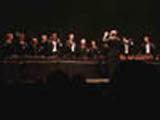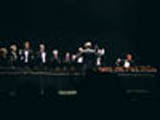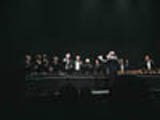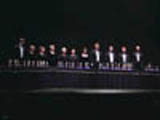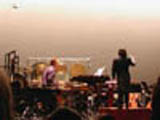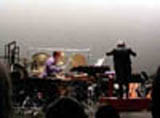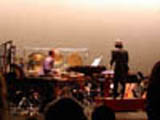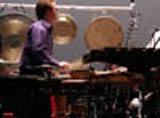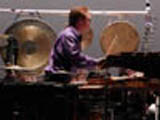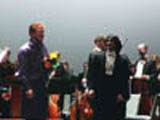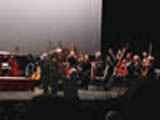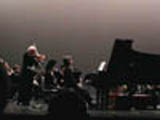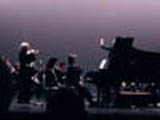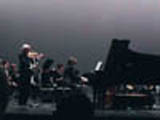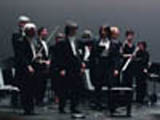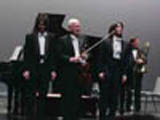The exciting feature of tonight's entertainment was my first visit
to the newly-opened Roda Theatre in downtown Berkeley. Located on Addison
Street, just a half block off Shattuck, this block is supposedly a keystone
of the 'Berkeley Arts Revival,' a project designed to breathe new life,
artistically, into downtown. Roda Theatre is part of a complex run by the
Berkeley Repertory Theatre, being the smaller of two performance spaces
there.
Tonight's symphony program was typically eclectic:
-
Schubert: Symphony No.5
-
Sonos Handbell Ensemble, performing Karen Lakey Buckwalter: Nocturne
in A minor
-
David Sheinfeld: Different Worlds of Sound
(a world premiere)
-
Alban Berg: Chamber Concerto
I was particularly beguiled with the handbell ensemble. As my previous
exposure to such performance was limited to Christmas Carols -- a style
of music I find rather boring -- I wasn't expecting much of the Ensemble,
but the short piece they performed was splendid. Full of soft tones and
sparkling resonances, the ensemble members coordinated their parts marvelously.
I'd like to see this group again!
I'd heard portions of the Sheinfeld piece at an open rehearsal that
Ting and I attended last June. At that time, the composer was still tweaking
things, and listening to him as he collaborated with the conductor as to
how to draw his intentions forth from the orchestra was a fascinating experience
in its own right.
Here, the work stood fully formed. Like many modern pieces, this
one was more or less tuneless. From start to finish, the percussionist
is crashing and banging, sometimes vigorously and other times with delicacy
and precision. All the while, the conductor waves his hands dramatically
forth and back, while the orchestra peeps and hoots and provides a controlled
cacophony in counterpoint to the percussion blasts. It reminded me a lot
of seeing Cecil Taylor leading a large group...
The Berg piece that concluded the show was interesting for several
reasons. The first third of the work has a focus on the piano -- the lead
violin being completely silent. This reverses during the second third of
the piece, with the lead being taken by the violin while the piano rests.
Only during the concluding movement do both instruments play, and end even
then, their lines are not so much a conversation as they are two voices
talking simultaneously. Interesting and strange! Definitely a work of the
20th Century.
To read another view of the show, see Berkeley
orchestra's Spangler virtuosic in Sheinfeld piece by Joshua Kosman.
Click here to see the program notes. |

